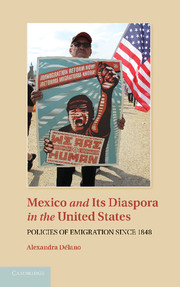Book contents
- Frontmatter
- Contents
- Acknowledgments
- Map
- Introduction
- 1 The Mexican State's Interests
- HISTORICAL BACKGROUND
- FROM LIMITED ENGAGEMENT TO ACTIVE EMIGRATION POLICIES (1982–2006)
- 4 From a Policy of Having No Policy to a Nation beyond Mexico's Borders (1982–2000)
- 5 The Migration Agreement (2000–2003)
- 6 Institutionalizing State–Diaspora Relations (2003–2006)
- Conclusions
- Bibliography
- Index
6 - Institutionalizing State–Diaspora Relations (2003–2006)
Published online by Cambridge University Press: 05 July 2011
- Frontmatter
- Contents
- Acknowledgments
- Map
- Introduction
- 1 The Mexican State's Interests
- HISTORICAL BACKGROUND
- FROM LIMITED ENGAGEMENT TO ACTIVE EMIGRATION POLICIES (1982–2006)
- 4 From a Policy of Having No Policy to a Nation beyond Mexico's Borders (1982–2000)
- 5 The Migration Agreement (2000–2003)
- 6 Institutionalizing State–Diaspora Relations (2003–2006)
- Conclusions
- Bibliography
- Index
Summary
I am very proud to be Mexican and the opportunity to participate and learn how the Mexican government works [through the IME] makes me feel that they haven't forgotten about the people that they failed as a government many years ago…Maybe because of remittances or whatever, but they are there.
– Member of the IME Advisory Council, Chicago, October 5, 2009Beyond the proposal for a migration agreement, the change in Mexico's position of limited engagement since the year 2000 was also evident in its increasing activism regarding its relationship with the Mexican and Mexican-origin population. Through the creation of the Presidential Office for Mexicans Abroad and, later on, through the establishment of the Institute of Mexicans Abroad (Instituto de los Mexicanos en el Exterior, or IME), the Mexican government, particularly the Foreign Ministry, became more actively involved in promoting migrants' political participation in Mexico, empowering community leaders to promote the Mexican migrants' agenda both in their home country and in the United States, and expanding services available for migrants in the United States.
This was part of a broader interpretation of Mexico's traditional definition of consular protection. Rather than focusing merely on the customary practices regarding the defense of migrants' human rights (i.e., providing aid in legal affairs and repatriations, supporting migrant organizations, and promoting Mexican culture), the Mexican government adopted new policies to improve its consular protection services for migrants and it expanded programs in areas of health, education, and financial literacy.
- Type
- Chapter
- Information
- Mexico and its Diaspora in the United StatesPolicies of Emigration since 1848, pp. 199 - 230Publisher: Cambridge University PressPrint publication year: 2011



